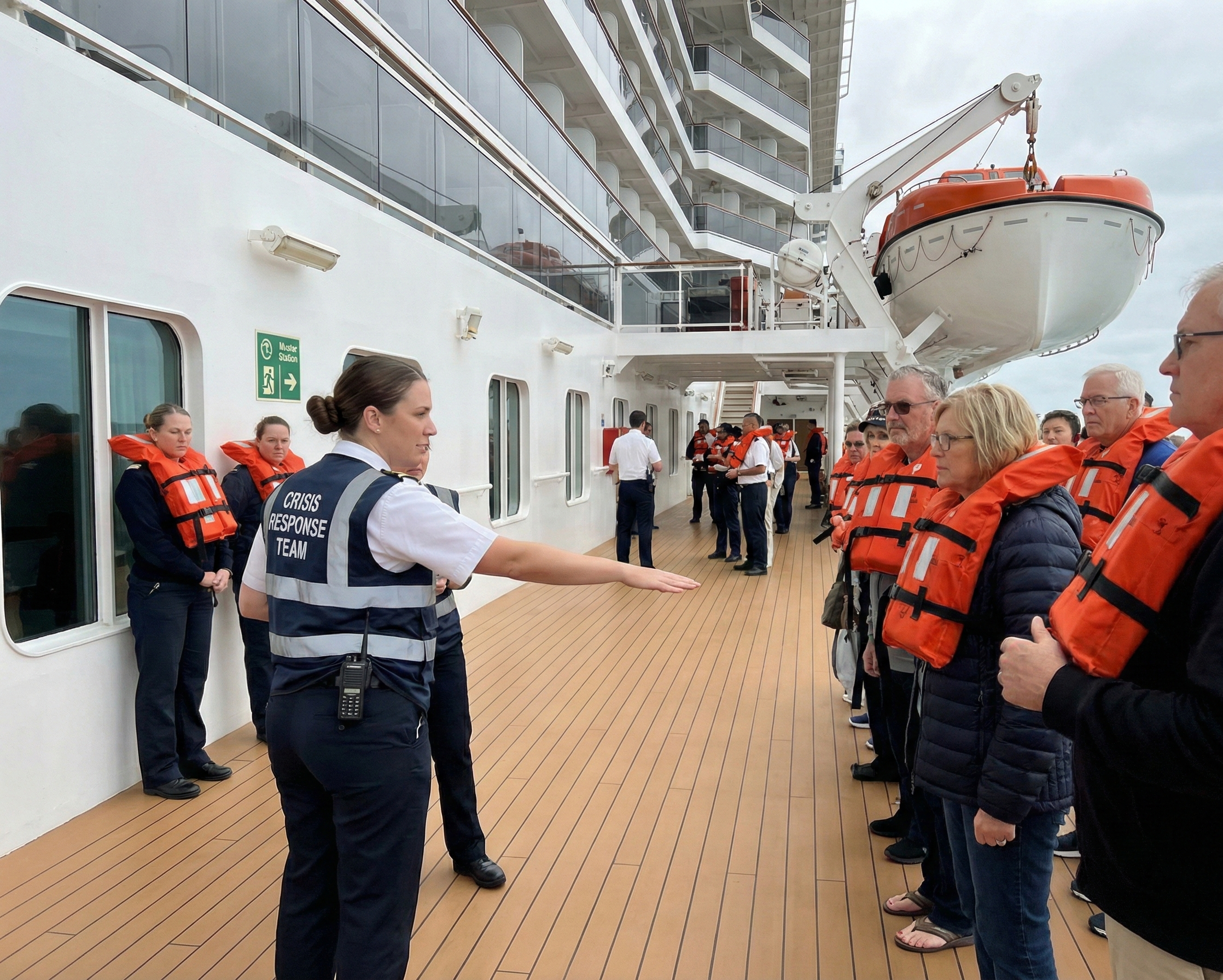Passenger Management in Emergency Training Course
- Format: online on interactive platform
- Duration: 1 day
- Language: Russian, Ukrainian, English
- Seat limitation: 30

The "Crisis Management and Human Behaviour on Passenger Ships" course is a specialized program for passenger ship personnel providing direct passenger services. The course is developed in accordance with the strictest international safety standards, including STCW Convention requirements, SOLAS 74 Convention, IMO Resolutions MSC 417 (97) and MSC 416 (97), as well as IMO Model Course 1.42 recommendations.
In critical situations aboard passenger ships, correct personnel actions can save hundreds of lives. This course teaches not only theoretical knowledge but also practical skills in crisis management, understanding passenger psychology, and effective communication under the pressure of emergency circumstances.
The program covers all aspects of working with passengers – from routine embarkation procedures to managing people in panic during evacuation. You will learn to maintain composure, make quick decisions, and effectively coordinate actions in the most challenging situations.
-
-
Establish and maintain effective communication with passengers and crew members in normal and emergency situations
-
Professionally work with passenger embarkation and disembarkation procedures, ensuring their safety and comfort
-
Optimally utilize available resources in crisis situations for maximum effectiveness
-
Quickly and adequately respond to various types of emergencies aboard passenger ships
-
Effectively control passenger behavior during evacuation and other critical situations
-
Manage other personnel and coordinate their actions in emergency circumstances
-
Understand the psychology of human behavior during stress and panic and apply this knowledge in practice
-
Prevent escalation of conflict situations and calm anxious passengers
-
Upon successful completion of the course, consisting of 5 modules with video lessons, supplementary materials, and documents, you will need to confirm your competence by passing a final test.
After successfully passing the test, you will receive an official "Crisis Management and Human Behaviour on Passenger Ships" certificate, which is recognized by international maritime organizations and is a mandatory document for passenger ship personnel in accordance with STCW Convention and SOLAS 74 requirements.
This certificate confirms your readiness to act effectively in crisis situations and ensure passenger safety, which is critically important for working on passenger ships of any class.
Course Reviews
Excellent English course! Perfect pronunciation training and maritime terminology. Highly recommend for all seafarers.
Great interactive lessons. The technical English section was particularly useful for engine room communications.
Good course structure and materials. Would love to see more practice with radio communications.
Perfect for beginners! Clear explanations and plenty of practice exercises. My confidence improved significantly.
How it works:
1. Choose us
We have been in the market for over 20 years. Our courses are certified and recognized worldwide.
2. Register
Complete online registration to save time. Choose a course and after registration and payment, you will get access to training without extra steps.
3. Complete the course
Training is available from any device: PC, laptop, tablet or smartphone (iOS/Android). You can choose online format or download materials.
4. Evaluate knowledge
Assessment is conducted in the form of a test with multiple choice questions. After successful completion of testing, you will receive a certificate.
5. Get certificate
You will be provided with a link to download the certificate. The certificate can be printed at any time. If desired, the original printed copy can be ordered by mail.
How it works:
1. Choose us
We have been in the market for over 20 years. Our courses are certified and recognized worldwide.
2. Register
Complete online registration to save time. Choose a course and after registration and payment, you will get access to training without extra steps.
3. Complete the course
Training is available from any device: PC, laptop, tablet or smartphone (iOS/Android). You can choose online format or download materials.
4. Evaluate knowledge
Assessment is conducted in the form of a test with multiple choice questions. After successful completion of testing, you will receive a certificate.
5. Get certificate
You will be provided with a link to download the certificate. The certificate can be printed at any time. If desired, the original printed copy can be ordered by mail.
Frequently Asked Questions
This course is mandatory for all seafarers, officers and ratings working on board a vessel, in accordance with STCW A-VI/6, p. 1.
To enroll in the course, you need a valid medical certificate and a valid seaman's passport.
After completion, you will know different security levels, emergency procedures, and be able to recognize and avoid threats.
The course covers information about different security levels, emergency procedures, threat recognition and avoidance methods. You will learn about ship security, port facility security, and relevant international regulations.
Yes, the course is fully online and can be completed remotely. You can access the materials at any time convenient for you, from any device with internet access.
Upon successful completion of the course, you will receive an internationally recognized certificate that complies with STCW requirements. The certificate will be available for download immediately after passing the final test.
Yes, the certificate is fully compliant with the International STCW Convention 78 (as amended) and is recognized by maritime administrations of Panama, Liberia, Marshall Islands, and the USA.
Yes, you can take the course from any country as long as you have a stable internet connection. Our platform is accessible worldwide, 24/7.
The course duration is flexible and depends on your learning pace. On average, it takes 2-3 days to complete all materials and pass the final test.
The course cost is competitive and includes all materials, tests, and certification. Please contact our managers for current pricing and available discounts.
The course is available in multiple languages including English, Ukrainian, and Russian. You can choose your preferred language when enrolling.
